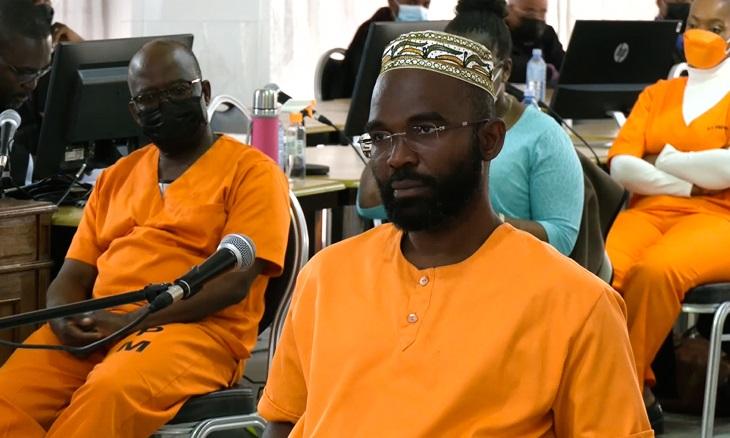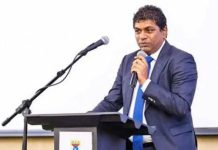Africa-Press – Mozambique. The law governing the Mozambican Security and Intelligence Service (SISE) “does not apply to SISE operations”, declared the former head of economic intelligence in SISE, Antonio Carlos do Rosario, on Monday.
Speaking before the Maputo City Court, where he and 18 others are on trial for crimes connected to the country’s largest scandal, the case of the “hidden debts”, Rosario declared “the working methods of SISE cannot be found in the Organic Law on SISE”.
He was answering questions about Txopela Investments, a company which he effectively controlled, before his arrest, and which the former General Director of SISE, Gregorio Leao, has described as “an operational vehicle” for SISE.
So where, in Mozambican law, were these “operational vehicles” defined, asked the prosecutor, Sheila Marrengula? The short answer is that they are not. If SISE operations were in the law, said Rosario, “SISE would cease to be a secret service”.
“We use methods that are not in the law, although they are not necessarily illegal”, he added.
He denied that Txopela Investments was actually part of SISE. SISE did not own shares in the company, but it did use it for undefined “operations”.
Rosario claimed that SISE used many other companies, and sometimes their owners did not even know the security services were using them. As an example, he cited the publicly owned electricity company, EDM. He suggested that SISE might use EDM repair teams as a cover to enter private houses, and plant devices.
“So EDM is invading citizens’ privacy”, remarked judge Efigenio Baptista. At this, Rosario saw that he had made a mistake and tried to take his words back. He had just been giving a theoretical example, he said.
Much of the day’s proceedings concerned Rosario’s property dealings. The prosecution argues that his substantial real estate portfolio results from substantial bribes paid by the Abu Dhabi based group, Privinvest.
Privinvest was the main beneficiary from the “hidden debts” – it became the sole contractor for the three fraudulent companies at the heart of the scandal, Proindicus, Ematum (Mozambique Tuna Company) and MAM (Mozambique Asset Management). On the basis of illegal loan guarantees from the government of the day, under the then President Armando Guebuza, the three companies obtained loans of over two billion US dollars from the banks Credit Suisse and VTB of Russia.
The loan money was sent, not to the companies, but directly to Privinvest, which then sent fishing boats, patrol vessels, drones, radars and other equipment to Mozambique. An independent audit of the three companies in 2017 showed that these assets were grossly overpriced. Privinvest had over-invoiced the Mozambican companies by more than 700 million dollars, which meant it had plenty of money available to pay bribes.
The money for Rosario went via other companies, notably Txopela, and so Rosario attempted to separate his own affairs from those of Txopela. Whenever the prosecution showed documents that contradicted his version of events, Rosario dismissed them as forgeries, or claimed that Txopela’s business had nothing to do with him.
For one document, concerning the purchase of flats in central Maputo, he complained “that doesn’t even look like my signature”, while he dismissed another because it referred to him as “Rosario” rather than by his full name.
Another document on money transfers cited Rosario’s name unmistakably, but he declared “it’s not valid, it’s all part of the theatre”.
Any doubts that it was Rosario that pulled the strings on Txopela investments should have been quashed with a cache of documents seized from what the prosecution believed was his office in Maputo Shipyard, a wholly owned subsidiary of MAM.
The documents were seized in September 2019 in a raid authorised under a separate, autonomous case connected with the hidden debts. The key documents are from 2015, and show that Txopela reports to Rosario.
Rosario replied that he never had an office in Maputo Shipyard, and that the documents looked far too new to have been produced in 2015. Marrengula replied that the documents looked new because they were photocopies – the originals were in the file for the second, autonomous case.
But Rosario continued to insist that any incriminating documents must have been forged or planted. Baptista pointed out that the search had been ordered by the Maputo City Court. Was Rosario really claiming that the judges on the City Court, himself included, were complicit in forgery?
Baptista warned “it is not enough to claim forgery, you have to prove it”. Suspects who believe the evidence against them is fake, can always demand a forensic inspection of the proof, and so far Rosario has not done so.
Earlier in the trial Rosario had claimed that, although he was chairperson of the board of Proindicus, Ematum and MAM, he had never drawn a salary from any of the three companies. But the prosecution has bank statements proving that he was handsomely paid.
Rosario denied the authenticity of any digital bank documents, and said he would only comment on non-digital copies. But documents from one bank, the BCI, are already in the format Rosario finds acceptable, and statements from 2014 show him receiving salaries – for example, 238,700 meticais (about 3,730 dollars, at current exchange rates) in February 2014.
“Who was paying these salaries?”, asked Marrengula.
“I am not obliged to reveal my personal affairs here”, replied Rosario.






